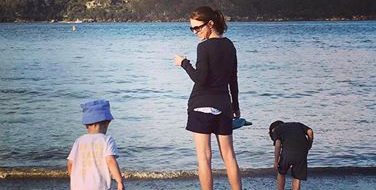“It’s horrific and it’s beautiful at the same time.” –Don’t Look Up
You guys, I think the call may be coming from inside the house.
Remember my neighbour who told me about his friend, who takes his dog to a therapist and really the therapist is treating the dog’s owner? I think that may be happening to me with The Kid’s psychologist. I’ve been hoodwinked into therapy.
I mean, not really, because a) I don’t actually think that’s what is happening, and b) I don’t need to be hoodwinked into therapy because I would go/will go/have gone willingly. But after his session yesterday, when she and I had our little recap that started with her telling me to take a seat, I may as well have been on the metaphorical couch for those ten minutes.
Cut to bedtime. I asked him about something he’d mentioned earlier, a game of basketball at school when he’d felt excluded, and in those dark and tired moments just before sleep, out came the avalanche of feelings: how he feels invisible, how people will walk away before he’s finished talking, how hard autism can make things for him and he doesn’t understand why he has to have it.
My own heart breaking, I fought my way through a prayer over him, a prayer giving thanks for how he’s made and the story being told by his life, and once he fell asleep beside me I sent up my own private prayer: a cocktail of what the f–k and help that I’ve gotten quite used to over the years, uttering it after romantic collapses and professional crises and, well, during the throes of motherhood nearly daily. It’s a prayer you won’t find among polite church groups or in venerated prayer books. Formally, it’s called a lament. For me, it’s the most honest secretion from a rent heart.
I’m so thankful to have someone to get mad at when things hurt.
“Relating to God in a way that seemed disrespectful is one of the most powerful ways I experienced his grace,” writes my counsellor (and performer of my marriage ceremony) Gordon Bals. Lament, like smiling for Buddy the Elf, is my favourite, because it’s a counterintuitive expression of faith: “LOOK at what you’ve allowed to happen. It HURTS. Now SHOW UP HERE.”
Australians have a fun turn of phrase that opens many of their sentences when they’re making a point. Unlike when disingenuous politicians use it, it’s more of a deepening of the conversation, an opening meant to gently draw attention to what comes next: “Look.” It’s followed by whatever point they want to make and isn’t meant to be a bullhorn or showstopper, just a nudge to get attention (or maybe even a verbal/cultural habit, like in America when people say, “I’m not racist, BUT”).
I’ve been saying “Look” to God for awhile now, but it’s not gentle. It’s the bullhorn version. His reply, however, is the Aussie version. His “Look” is a beckoning, an invitation to see how he has shown up, which means that he in his grace will continue to. It means that he already sees and is gently nudging me to see, as well, what I didn’t before. His response to my lament is kindness. Brutal kindness.
–“LOOK at this caterpillar sting” (seriously, how do I go my whole life without even knowing this can happen then get a double dose in a week?!).
—Look at how it’s not a redback bite.
–“LOOK at how you’re forcing us to leave everything we know and move across the world.”
—Look at all I have for you there. Also–nice beach, right?
–“LOOK at motherhood being way too hard and breaking my heart.”
—Look at the healing and redemption of your own story that these moments with your children bring. Also? They’re going to be okay.
After a bedtime of heartbreak and a night of lament, I wake up to an enraged caterpillar sting–the area has gotten worse. Rain pelts me on my morning run. BUT. I beat The Husband on Wordle. I hear Little Brother and TK playing basketball in LB’s room and remember that brotherhood means there’s always a game you can join. I walk the boys to the gate and see TK approach one of his friends who was playing basketball yesterday, walk right up to him the way we practised, and I don’t hear what he says but I bet that’s what we practised too, and I see the friend put an arm around him.
I look. And in the constant heartbreak and lament, I still see, and give thanks for what I see–and for all that lies beyond it.










